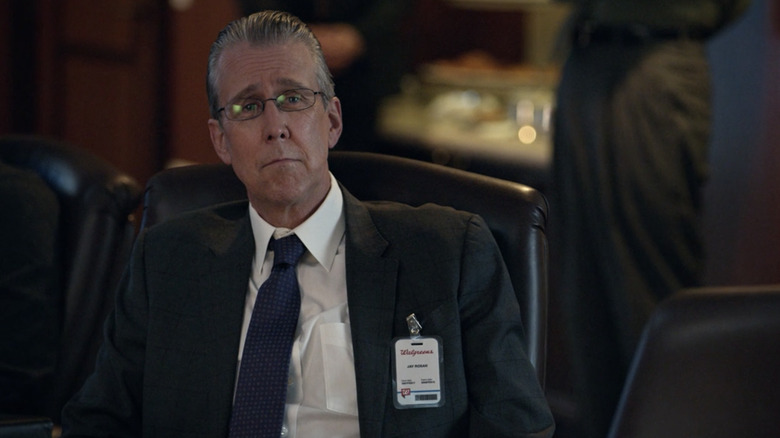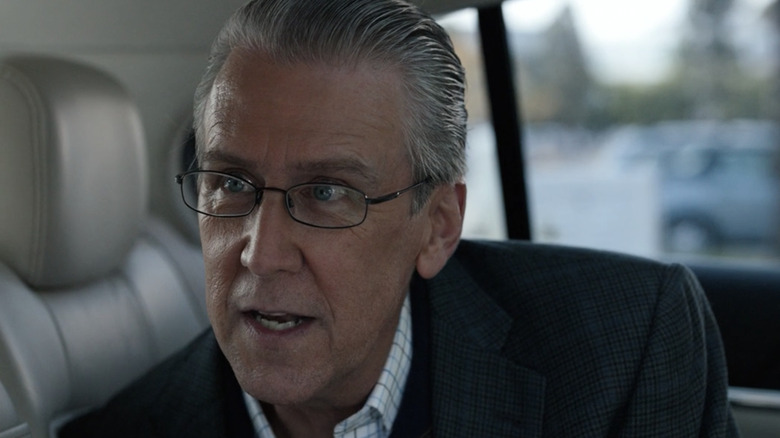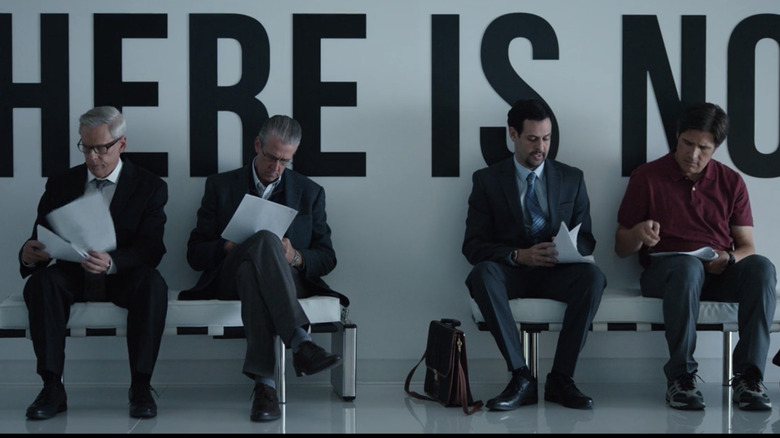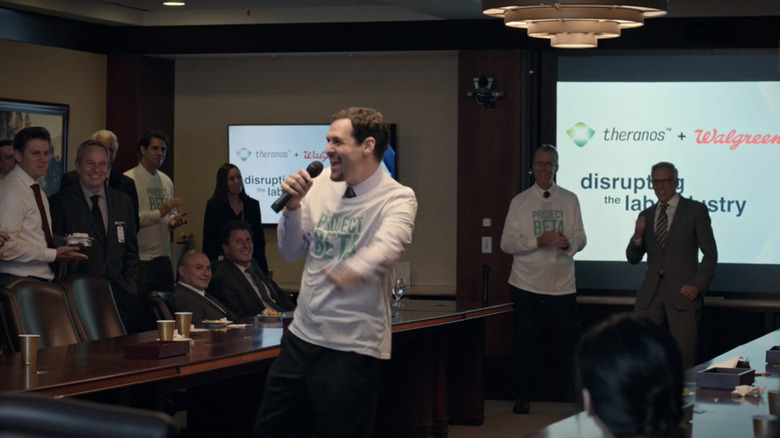The Dropout Actor Alan Ruck On The Joys Of Making 'A Complete Ass' Of Himself Onscreen [Interview]
Self-described "geezer" Alan Ruck made his "The Dropout" debut in an episode aptly titled "Old White Men," focusing on the execs pulled into Theranos by a desire to further their wealth and keep up with young biotech superstar Elizabeth Holmes. The series, which hails from "New Girl" creator Elizabeth Meriwether, delves into the story behind the billion-dollar company that claimed it would revolutionize the medical world forever — only to fail to deliver on its many promises. While much time is spent unpacking the mystery that is Elizabeth Holmes (courtesy of a gripping performance by Amanda Seyfried), the series makes plenty of times for the other people in her orbit, including those who went all-in on Theranos and those who suspected it would fail from the start. Unfortunately for Alan Ruck's Jay Rosen, he's one of the former: A strong Theranos supporter who saw his involvement as an opportunity to make a big splash. And, well ... we all know how that ended up.
Fans of "Succession" will be thrilled to see Ruck make a scene-stealing appearance, especially given his character has a few things in common with the ever out-of-touch Connor Roy. Maybe it's their status or shared desire to come out on top — or maybe it's the fact that both get their fair share of comic relief moments. Jay brings some complex emotions to the table, too, including a memorable epiphany sparked by a Katy Perry song. In our conversation, Alan Ruck talks Katy Perry, musical moments, and the complicated nature of a character like Jay Rosen.
This interview has been lightly edited for clarity and includes mild spoilers for episode 4 of "The Dropout."
'The character defects of the men involved ... gave her a lot of her power'
Probably my favorite moment for Jay is when you get to have this emotional moment to a Katy Perry song, to "Firework." I would love to know what your response was to seeing that in the script and hearing that song used for that moment.
Maybe I had heard that song ... I'm kind of a geezer now myself. Maybe I had heard that song somewhere along the way, but I wasn't that familiar with it. I actually have an 11-year-old daughter, and she's like, "Yes, Dad," and she told me about it. I asked Michael Showalter, our director, I said, "Why do you think this particular song? How is it that he knows this song?" Michael said, "Well, I think that Jay has a teenage daughter and he's listened to her play her music. And for whatever reason, he's at a point in his life ... it's kind of a later midlife crisis, but maybe he's having a little midlife crisis. He wants people to see the real Jay. He wants to make one last big splash and be a winner."
What were your initial impressions of the character when you got the script?
You keep coming back to the fact [that] ... Jay is an accomplished fellow. He's a physician, he's the medical director for Walgreens, he's founded other companies, he's done some impressive things. But there are people that are much fancier than him. There was George Schultz. There was Henry Kissinger. I mean, there were big people, highly intelligent, who just made ridiculous mistakes, who projected onto this young woman what they wanted.
For all of them, it was something like: "I'm going to make a little history here, and I'm going to make millions of dollars in the process. It'll be another thing that I can crow about, another thing I can say [is] part of my legacy." I think there's a lot of ego involved for a lot of these people, and I think that's where a lot of her power was, that these men projected onto her some of their hopes and dreams, and mostly it was about money and status. I think it was mostly the character defects of the men involved, especially, that gave her a lot of her power.
'In the way the Greeks typified tragedy in comedy, actually, this does qualify as a comedy'
There's a level at which the show is making fun of Jay and using him for comedy, but also there's a lot of empathy for how everyone involved gets sucked into her orbit.
Apparently, he does have, or did have that habit of introducing himself as Dr. Jay. "I used to play basketball," and everybody would laugh. Or not. So, he's a little goofy. I mean, that thing is a little goofy. That little bit of information that is true about him. So, it gives you a feeling for a human being. It's like, "Oh, he's a doctor, but he's a little bit of a nerd," maybe in some ways. Those are some of the feelings that I got.
Right. It's certainly not a comedy, but there's definitely a lot to laugh at, especially knowing the truth of it all, that a lot of these details are true. And knowing what happens in the end as they're making these decisions.
I think in the way the Greeks typified tragedy in comedy, actually, this does qualify as a comedy because none of the lead characters die, and the lead characters tend to be upper-class people who do really foolish things and then get their comeuppance one way or another. That's definitely true in this show. And then we don't know what's going to happen with Elizabeth with her sentencing and what's actually going to happen to her. So, I think people will watch it and say, "That's really a shame. That's a waste," because she had a lot going for her, and some of it was self-destructive. Some of the things that happened to her were certainly self-destructive. But you have to laugh at just how foolish these men were. I've heard people who've watched it said that they were yelling at the television screen, "Don't do it."
Jay's definitely different from your "Succession" character, from Connor. But I also found myself thinking about him because of this wealthy, white, old generation parody of it all.
It was a big tip-off, the title of episode 4 being "Old White Men." It's like, "Well, these guys that are in these powerful positions, it doesn't mean they have all the answers, certainly." Some of them are very talented people and had things to offer to society or to their chosen field, whatever it was. But they're still just human beings and are capable of some very silly mistakes.
'Whenever you have a scene where you make a complete ass of yourself ... you live for stuff like that'
When you're playing a complicated character like this, do you withhold your own judgments on their actions or your own opinions, or is that part of your performance?
People that play horrific characters, serial killers, or whatever, I don't exactly know where they go, but generally, I think you have to find something that is redeemable or something that's likable about whomever it is you're playing. But that doesn't mean away from the set. You might think, "Well, he's a fool," or "He was selfish," or "He was greedy," or "He was unobservant," or whatever judgments you may have. But when you're on the set, on the day, in the middle of it, you just go. They say, "action," and I'm talking to Amanda [Seyfried], who's now Elizabeth, and we're just talking about whatever it is we're talking about. And there are no judgments that come in.
Does it change at all when it's based on a real person? With Connor, you have a lot of the worst attributes of this kind of person, but he is fictional.
Right. Well, I didn't make contact with Jay Rosen because I just didn't think it would do him any good, and I actually didn't feel that it was going to help me in any way. It's just, I tried to imagine myself being a guy about my age, thinking about retiring, and wanting to have one last big score, and then have this thing fall in my lap that seemed like it was a dream come true. So that's all I did with that. In a different movie, in a different show, it would be a different situation where you might actually have to go spend some time with the person and try to get to know them, if they're still alive. Or talk to people who knew them. But I didn't feel that was necessary with this at all.
At the end of the episode, you have a little bit of a song and dance, when they're celebrating the launch. I'd love to hear about that day.
As I recall, that was mostly Andrew Leeds with a microphone [laughs] and we had on these really idiotic T-shirts, these Theranos Walgreens T-shirts. And it was Josh Pais and myself and Andrew, and we were sort of serenading Elizabeth — Amanda — because we'd finally struck the deal. It was a done deal. And I believe the song was, "What I Like About You." You kind of live for that. Whenever you have a scene where you make a complete ass of yourself, actually you live for stuff like that because, between takes, you tend to laugh like hell, and have a pretty good time.
The first four episodes of "The Dropout" are now streaming on Hulu, with new episodes arriving weekly through April 7, 2022.



